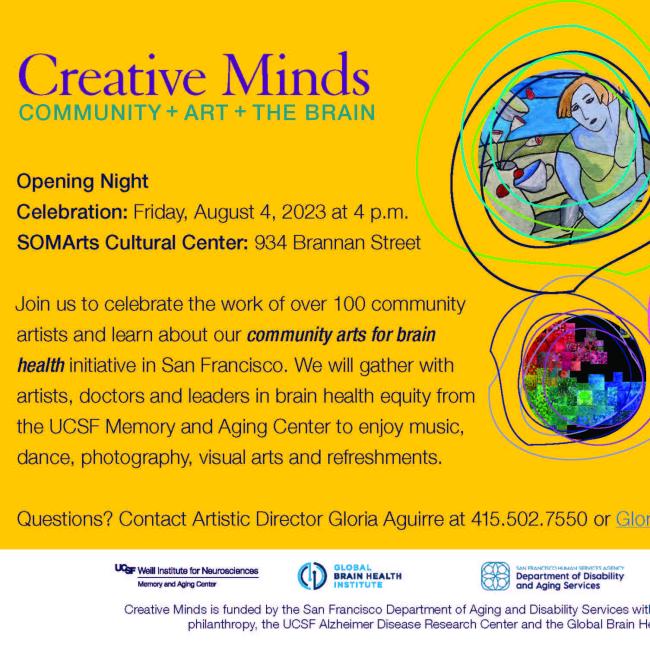‘Creative Minds’ Showcases Community Arts for Brain Health

Luis Martinez (right) embraces a community member at the Creative Minds art exhibit at the Mission Neighborhood Center in San Francisco. Image by Elisabeth Fall.
How does creativity affect the brain health of a community?
On December 5, community members gathered at the Mission Neighborhood Center in San Francisco for “Celebración Comunitaria de Mentes Creativas,” a celebration for Creative Minds, a community arts for brain health initiative. The event—held primarily in Spanish—was hosted by Mission Neighborhood Center in collaboration with the UCSF Memory and Aging Center (MAC) and the Global Brain Health Institute (GBHI).
Participants of Creative Minds exhibited beautiful artwork, including photography, paintings, and other creative expressions. These included about fifty original pieces completed during the COVID-19 pandemic.
“Un dibujo me sale de mi mente, me siento muy bien, me siento muy orgullosa de lo que hago. No pienso solo en el momento, pienso en el futuro. Al arte ayuda mucho” [When I draw and see what comes out of my mind, I feel good, I feel very proud of what I do. I don’t only think about the moment, I think about the future. Art helps a lot], said Esperanza “Espy” Salazar, a Creative Minds artist.
Established in 2020, Creative Minds supports healthy aging and social connection in San Francisco communities through photography, art, storytelling, movement, and craft-making. This unique collaboration between the UCSF MAC Community Outreach Program, community partners, and Atlantic Fellows for Equity in Brain at GBHI engages older adults living in neighborhoods that are underserved and underrepresented to the UCSF MAC.
“Art, dance, and other forms of creative engagement and expression are powerful ways of promoting brain health because they incentivize socialization, exercise, and cognitive stimulation—three factors that may help us prevent cognitive decline,” said Serggio Lanata, associate professor of neurology at UCSF, a GBHI faculty member, and director of Creative Minds.

Body map art produced by Creative Minds artists. Image by Elisabeth Fall.
There is currently no known cure for the diseases that cause dementia; however, up to 40% of cases could potentially be prevented by public health and lifestyle interventions, such as education, exercise, and socialization.
“Often we have participants say they never had the opportunity to create art,” said Gloria Aguirre, community outreach manager at GBHI and UCSF MAC and manager of Creative Minds. “The novelty inspires curiosity to learn more about brain health and to be more involved in their community, as well as community-based research and clinical services. We are bridging arts and health.”
Creative Minds partners with community centers and clinics throughout San Francisco to incorporate brain health education and offer creative experiences informed by the cultural and linguistic needs of its community members. Clinicians and international professionals in the arts and community practice engage older adults in Spanish, English and Chinese to support healthy aging and improve access to expert clinical care and research opportunities.
“Creative Minds has provided wonderful opportunities for our community members to stay connected to each other to get connected with health services they need,'' said Aurora Alvarado, director of the healthy aging program at Mission Neighborhood Center.
Overcoming challenges imposed by the pandemic, Creative Minds pivoted programming to a virtual space in May of 2020, spearheading the delivery of brain health education and creative workshops virtually. This provided opportunities to connect that otherwise may not have been possible. For instance, a photographer based in Peru (Alex Kornhuber, Atlantic Fellow) and a dance artist in New York (Magda Kaczmarska, Atlantic Fellow) led workshops to the San Francisco-based participants. The event on December 5 was the first time many of the community members met in person in almost two years.
“He podido aprender como sacar mis emociones en mis dibujos. A veces me siento deprimida, a veces muy alegre. Dibujar siempre me emociona muchísimo, me fascina” [I have been able to learn how to get my emotions out in my drawings. Sometimes I feel a little down, sometimes I feel very happy. Drawing always excites me, it fascinates me], said Ana Miranda, a Creative Minds artist.
Creative Minds is funded by the City of San Francisco's Department of Disability and Aging Services, the UCSF Memory and Aging Center, and GBHI. It also includes contributions from Atlantic Fellows Kunle Adewale, Karin Diamond, Luis Martinez, Stefanie Piña Escudero, Mollie Rose and Dvera Saxton. Learn more at www.gbhi.org/projects/creative-minds.

Creative Minds artists and organizers. Image by Elisabeth Fall.
Authors

Niall Kavanagh
Communications Officer
GBHI Members Mentioned

Serggio Lanata, MD, MS
Associate Professor of Neurology

Gloria Aguirre
Community Engagement Manager and Creative Minds Artistic Director

Kunle Adewale
Artist

Karin Diamond
Artistic Director

Magda Kaczmarska, MFA
Dance Artist

Alex Kornhuber
Photographer

Luis Martinez, MD, MPH
Neurologist and Clinical Researcher

Stefanie Piña Escudero, MD
Geriatrician

Mollie Rose
Pilates Teacher

Dvera Saxton, PhD
Medical & Environmental Anthropologist




